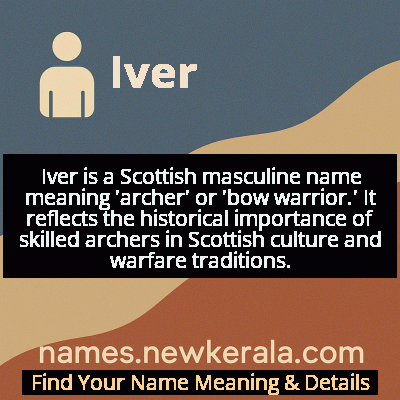Iver Name Meaning & Details
Origin, Popularity, Numerology Analysis & Name Meaning of Iver
Discover the origin, meaning, and cultural significance of the name IVER. Delve into its historical roots and explore the lasting impact it has had on communities and traditions.
Name
Iver
Gender
Male
Origin
Scottish
Lucky Number
9
Meaning of the Name - Iver
Iver is a Scottish masculine name meaning 'archer' or 'bow warrior.' It reflects the historical importance of skilled archers in Scottish culture and warfare traditions.
Iver - Complete Numerology Analysis
Your Numerology Number
Based on Pythagorean Numerology System
Ruling Planet
Mars
Positive Nature
Generous, passionate, energetic, and humanitarian.
Negative Traits
Impulsive, impatient, moody, and can be overly emotional.
Lucky Colours
Red, maroon, scarlet.
Lucky Days
Tuesday.
Lucky Stones
Red coral, garnet.
Harmony Numbers
1, 2, 3, 6.
Best Suited Professions
Military, sports, philanthropy, leadership roles.
What People Like About You
Courage, energy, leadership, generosity.
Famous People Named Iver
Iver Lawson
Cyclist
American champion cyclist who set multiple world records in the 1880s-1890s
Iver Kleive
Musician and Composer
Norwegian organist and composer known for his sacred music and collaborations with jazz musicians
Iver C. Werme
Military Officer
Norwegian-American military officer who served with distinction in World War II
Name Variations & International Equivalents
Click on blue names to explore their detailed meanings. Gray names with will be available soon.
Cultural & Historical Significance
Throughout Scottish history, Iver has maintained its connection to warrior traditions and archery skills, reflecting the importance of these abilities in medieval Scottish warfare and hunting culture. The name appears in various historical records and clan histories, often associated with skilled hunters and warriors who protected their communities. This historical significance gives the name a sense of heritage and strength that continues to resonate in modern Scottish culture, where traditional names are increasingly valued for their connection to Scotland's rich historical tapestry.
Extended Personality Analysis
Individuals named Iver are often perceived as strong, resilient, and focused, with a quiet intensity that reflects their archer symbolism. They tend to be strategic thinkers who approach challenges with precision and patience, much like an archer carefully aiming before releasing an arrow. Ivers are typically independent and self-reliant, possessing an inner strength that allows them to withstand pressure and overcome obstacles. Their calm exterior often masks a determined spirit and sharp observational skills, making them excellent problem-solvers who notice details others might miss.
While they may appear reserved initially, those who know them well appreciate their loyalty, reliability, and the depth of their commitment to people and causes they value. Ivers often excel in situations requiring concentration and skill development, whether in professional settings or personal pursuits. They tend to be traditional in their values yet innovative in their approaches, blending respect for established methods with creative problem-solving. This combination of traits makes them particularly effective in leadership roles where steady guidance and strategic vision are required, though they may prefer to lead by example rather than through overt authority.
Modern Usage & Popularity
In contemporary times, Iver remains a distinctive but uncommon name, primarily used in Scotland and among Scottish diaspora communities. While it has never reached mainstream popularity charts, it has experienced a modest revival in recent years as parents seek traditional Scottish names with strong historical roots. The name appeals to those looking for a masculine, heritage-rich name that stands out without being overly unusual. Its usage is concentrated in Scotland, particularly in the Highlands and Islands, with occasional appearances in other English-speaking countries where Scottish cultural heritage is valued. The name maintains its traditional appeal while fitting well with modern naming trends that favor short, strong-sounding masculine names that are easy to pronounce yet carry significant cultural weight.
Symbolic & Spiritual Meanings
Symbolically, Iver represents precision, focus, and the ability to hit targets from a distance—both literally and metaphorically. The archer symbolism extends to concepts of vision, foresight, and strategic planning, suggesting someone who can see opportunities and challenges before others do. The yew tree component adds layers of meaning related to longevity, resilience, and protection, as yew wood was historically prized for making powerful longbows and was considered a sacred tree in Celtic traditions. This combination creates a rich symbolic profile of someone who combines patience with action, tradition with innovation, and strength with subtlety. The name evokes images of the lone warrior who relies on skill and intelligence rather than brute force, making it symbolic of measured power and thoughtful execution in all aspects of life.

